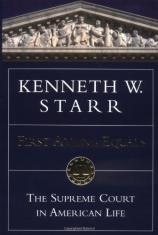First Among Equals: The Supreme Court in American Life
Review
First Among Equals: The Supreme Court in American Life
Early in FIRST AMONG EQUALS Ken Starr describes President John
Adams as a "virtuous, principled man, lacking in political skills."
This characterization could easily be applied to the author
himself. Starr, the independent counsel whose investigation in 1998
of the Clinton-Lewinsky mess led to the passage of two articles of
impeachment in the House of Representatives, was famously demonized
in a public relations war waged by his political enemies who sought
to discredit him and his work as independent counsel. Four years
later, Starr returns to the public arena as the author of a book
about the Supreme Court, an institution he worked for as a clerk
and appeared before in private practice and as Solicitor General
under the first President Bush. The book opens a window through
which Court observers --- casual and professional alike --- will
gain insight into the Court's history, workings, and
personalities.
In examining the Court over the last thirty years, Starr reviews
the tools and methods the Court uses to decide polarizing cases
involving abortion, criminal procedure, free speech, affirmative
action and others. Starr, a political conservative, prefers
decision-making processes that adhere to precedent, are firmly
rooted in statutory or Constitutional text, and aspire to the
unifying principles of equality and neutrality. In the 1960s, under
Chief Justice Earl Warren, the Supreme Court was prone to --- in
Starr's view --- the worst sort of activist decision making. The
Warren Court acted not as judges but as liberal political reformers
who, with "missionary zeal," sought to reshape society through a
series of radical, constitutionally unsound decisions.
Although FIRST AMONG EQUALS includes no formal analysis of the
Warren Court, Starr frequently references Warren for his lasting
impact, especially with regard to privacy issues. For example, the
right to abortion found in Roe v. Wade, which was decided after
Warren left the Court, would likely not have happened were it not
for expansive privacy rights first announced by the Warren
Court.
Warren Burger sat as Chief Justice from 1969-1986. As a young
lawyer, Starr clerked for Burger and he provides unique
perspectives on opportunities missed by that Court. Burger,
unpopular among his fellow justices, was a poor consensus builder.
And Starr, to his credit, does not fail to harshly criticize his
former boss for perceived failings. For example, Starr bemoans the
fact that Burger was unable to muster the votes required to
overturn the famous Miranda decision, which mandated that people in
custody be provided with warnings aimed against self-incrimination.
Starr almost relegates Burger to an insignificant figure when he
indicates that it was Lewis Powell, not Burger, who commanded the
most respect on the Burger Court. Powell, Starr claims, was the
driving force shaping the issues at the time.
Starr himself served as a judge for five years on the U.S. Court of
Appeals for the District of Columbia. He says he learned that
honorable, disinterested judges are the ones who can vote against
the people who helped put them on the bench. However, the current
Supreme Court justices for whom Starr has the most praise ---
Antonin Scalia and Clarence Thomas --- are the ones who
consistently fail this test. Scalia and Thomas usually vote on the
same side of most issues, and they almost always vote in a way that
accords with the beliefs of their judicial patrons. Thomas is
alleged by Starr to be an original thinker, brimming with
ideas.
Yet Starr fails to provide examples of his originality. Rather,
Starr cites numerous cases where Thomas predictably comes down on
the conservative side of a given dispute. By contrast, Justices
O'Connor, Kennedy, and the once ultraconservative Rehnquist have
established credentials as innovative thinkers, capable of voting
in ideologically surprising ways. Rehnquist, for example, adheres
strictly to the principle of upholding precedent --- his instincts
generally tell him to support existing case law for the sake of
judicial consistency. To this end, he has a proven record of voting
to uphold cases, like Miranda, which run contrary to his core
political philosophy.
Starr clearly has personal preferences among members of the current
Court, and he is not afraid to make plain his disdain for Justices
Souter and Stevens. In a chapter discussing the Bush/ Gore election
dispute, he relates an anecdote in which Souter comes across as
unprepared and almost foolish, as one of the advocates for then
Governor Bush corrects Souter on an obvious fact in the record.
Starr has great respect for Justice Breyer's intellect and his
ability to build consensus. Justice O'Connor is another favorite,
who Starr calls the "most influential and powerful woman in
America."
In the end, however, Starr's real favorite is the Court itself.
FIRST AMONG EQUALS is his love letter to an institution he reveres.
And this authoritative telling of some of its history adds greatly
to the rich tapestry of Supreme Court literature.
Reviewed by Andrew Musicus on January 21, 2011
First Among Equals: The Supreme Court in American Life
- Publication Date: October 10, 2002
- Genres: Nonfiction
- Hardcover: 320 pages
- Publisher: Grand Central Publishing
- ISBN-10: 0446527564
- ISBN-13: 9780446527569




